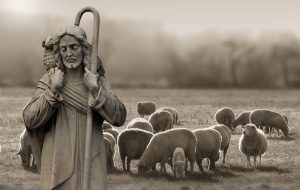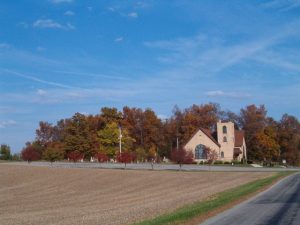Ten years ago, I sat in a hotel room in Montreal, Canada, holding a bilingual French and English Bible, found to my delight in the nightstand drawer. Our visit to the Province of Quebec was for only a few days to be enjoyed with dear friends from North Dakota. Nevertheless, I had thought it wise and fun to learn some of the local language and spent the summer months of 2009 learning French words and expressions. In our little group of four, I was the “expert”, however it took much courage to say anything beyond “bon jour” to the locals in French-speaking Montreal.
 My husband and I with the Wainds on Mt. Royal
My husband and I with the Wainds on Mt. Royal
With the parallel French and English Bible in hand, I wanted to find a way to express my Christian faith in French, but how? I turned to John 3:16, but found it too long and difficult to quickly remember. Then I looked up what is possibly the second most familiar passage, Psalm 23, and read L’Eternal est mon berger, The Lord is my shepherd – beautiful and easy-to-pronounce words.
It was thrilling for me to realize that those five words in English or French could be a very good self-introduction, a testimony to my identity in Jesus. I went on to learn the entire Psalm in French and, while I’ve forgotten most of the French menu items I memorized, I still find myself reciting Psalm 23 in French ten years later. In fact, I know it better in French than in English, having worked the words over and over on my tongue and in my mind, finding the phrases relevant in my life.
L’Eternal est mon berger. Who is this Lord and why do I need a shepherd? He leads me. He feeds me. He restores my soul. He protects me in the presence of evil. He gives me eternal hope and security. These are the reasons why the 23rd Psalm, sometimes called The Shepherd Psalm, is beloved by so many people.
 I am the good shepherd;
I am the good shepherd;
I know my sheep and my sheep
know me (John 10:14)
This topic idea sprouted one evening as my husband and I were watching Jeopardy on television after dinner, something we have enjoyed doing since my surgery, especially while James Holzhauer was playing. When you watch Jeopardy regularly, it becomes evident that certain topics are often sourced for clues, topics including history, science, movies, literature, and religion. Greek mythology, something I found interesting once, but don’t recall much of today, comes up often. I do better with questions about the Bible. Even without a lot of study, many Biblical concepts and stories are common knowledge in today’s society with many modern idioms originating in the King James English Bible translation. It’s likely that you can complete these common expressions:
- The blind leading the _____________________ (Matthew 15:13-14)
- By the skin of your _______________________ (Job 19:20)
- The handwriting on the ____________________ (Daniel 5)
- Drop in the _____________________________ (Isaiah 40:15)
- Eat, drink and be ________________________ (Ecclesiastes 8:15)
- For everything there is a __________________ (Ecclesiastes 3)
- Go the extra ____________________________ (Matthew 5:41)
Find answers and 30 more at Unlocking The Bible.
This week on Jeopardy, high school students, very bright and poised young people, are competing in a Teen Tournament. These young men and women are currently studying the stuff that Jeopardy is made of, plus they’re up on pop culture topics. The tournament is an opportunity for them to compete and to succeed, something we enjoy seeing. It’s not often that all three contestants are stumped by a clue. But it happened a few nights ago when host Alex Trebek read, in effect, “In the King James Bible, the 23rd Psalm begins with these five words.” All three students stood silently, none of them even hazarding a guess. Time ran out, Mr. Trebek waited a moment, leaned forward, then revealed, “That would be, ‘The Lord is my shepherd.'”

Perhaps, as someone in my household has suggested, they would have been able to answer “What is Psalm 23,” if asked “This one of the 150 Psalms in the King James Bible begins with ‘The Lord is my shepherd.'” Perhaps, my surprised reaction is naive in a day when fewer families are going to church and most schools have stopped including the Bible in their curriculum. Perhaps, students would credit Shakespeare with many of the common English expressions listed above. Consider this excerpt from Chuck Stetson’s article on FOX News’s website, “Teach the Bible in public schools so that students can better understand the world around them.”
First, teaching the Bible in public schools is important for students because, without knowledge of the Bible, students can’t fully understand the English language, English literature, history, art, music or culture. For example, there are over 1,200 documented references to the Bible in Shakespeare’s 36 plays. If you don’t know the Bible, you really can’t understand Shakespeare. You can’t get past the first sentence of Herman Melville’s Moby Dick – “Call me Ishmael” – if you don’t understand who Ishmael was in the Bible.
Of the allusions that a student needs to know for Advanced Placement in English Composition and Literature, approximately two-thirds are Biblical allusions, according to AP Literature and Composition. If you don’t know the Bible, you won’t do well on this part of the Advanced Placement test.
My sadness comes, not so much in the academic disadvantage, as in the personal disadvantage of not being familiar with what the Bible teaches. Stetson’s article cites statistics about Americans’ belief that the Bible should be taught in schools. In the school where I volunteer, kids are encouraged to follow the Golden Rule by treating others as they want to be treated, a challenge presented in the Bible in five words:
Love your __________________as yourself. (Matthew 22:39)
In a world where so many do unto others without love, sometimes struggling even to love themselves, could it hurt to present students with the teachings of Jesus? And in a world where people are trying to find their own way and end up lost, don’t you think we could use a Good Shepherd?

The country church were I learned that Jesus loves me.